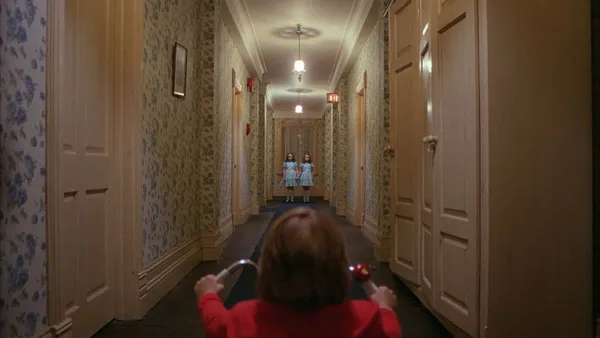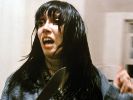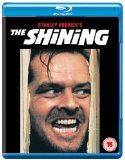Eye For Film >> Movies >> The Shining (1980) Film Review

Stanley Kubrick’s The Shining needs little introduction. A masterpiece of horror cinema, it features a bleak atmosphere, striking visuals, frenzied performances, and an utterly unshakable, creeping sense of dread. Adapted from Stephen King’s chilling bestseller, it tells of Jack Torrance (Jack Nicholson), a deeply troubled recovering alcoholic who accepts the position of off-season caretaker at the forebodingly isolated Overlook Hotel. His wife Wendy (Shelley Duvall) and young psychic son Danny (Danny Lloyd) accompany him there for the winter.
As the weeks go by, completely alone and eventually snowbound, the family begins to experience the devastating effects of the isolation, eerie atmosphere and bloody history of the hotel. Danny experiences horrifying visions, psychic flashbacks and precognitive dreams saturated with warnings of impending violence, while Jack’s already fragile mindset at last comes unhinged and he goes completely berserk...

As Rodney Ascher’s 2012 documentary Room 237 testifies, The Shining is a haunting and complex film that has mesmerised, terrified and obsessed audiences since its release in 1980. Kubrick deftly creates an enigmatic ambiguity, inviting myriad interpretations that seem to multiply with each viewing. Is the hotel really haunted, or have the isolation, feelings of guilt for past mistakes/outbursts and effects of cabin fever pushed the family into mental breakdown? At its core, The Shining is a deeply upsetting story of familial dysfunction. Strip away the supernatural aspects and what remains is a claustrophobic study of domestic horror, child abuse and psychological turmoil.
The source of the horror is the disturbed father, his unpredictable, violent temper, and increasingly menacing interactions with his wife and child, who are obviously terrified of him. Stresses and strains within the family are evident before they even arrive at the hotel – this troubling aspect is particularly enhanced by early scenes cut from the European release. The figure of the father – meant to protect and defend his family – becomes so subverted and warped it emerges as the thing that ultimately poses a threat to the family.
While the presence of the supernatural was overt in King’s novel, it is much more suggestive in Kubrick’s adaptation. The growing terror is rooted in a more esoteric, psychological space. The labyrinthine nature of the hotel and its grounds reflect the troubled and confused psychologies of the characters. The motif of the maze is evident throughout the film’s production design, repeated as it is in carpets, wallpapers, the never-ending empty hallways; it enhances the notion of doomed individuals who are trapped not only in a threatening physical space, but within their own minds, too. Their endless wanderings around the hotel, going into rooms and forbidden places, are arguably reflective of their internal attempts to confront and process unspeakable dark truths regarding themselves and each other.
Stephen King disliked Kubrick’s adaptation for many reasons - whole chunks of his plot are excised, and he felt that Jack Torrance was too obviously mentally unstable from the get-go. He is certainly depicted as being more vulnerable to insanity in Kubrick’s film; a failed writer, whose frustrations and feelings of inadequacy and impotency manifest early on – he blames his perceived failings as a man on his needy wife, who still seems to distrust him after he accidentally injured their son during a drunken rampage. These feelings of impotency seem to manifest during a particularly chilling encounter when he ventures into Room 237...
The scene in which Wendy discovers the extent of her husband’s instability is unforgettable, and builds to a nerve-shattering crescendo as he advances ever-threateningly towards her, forcing her to back away from him as he berates her. The constant threat of violence becomes unbearable in these moments. As Wendy, Shelley Duvall delivers a nerve-wrecked performance and as events unfold within the hotel, she becomes increasingly hysterical. The sight of her flitting nervously around the deserted hallways of The Overlook in her tatty dressing-gown, carrying a kitchen knife she seems ill-equipped to do anything with other than grip for sheer life, may illicit nervous laughter, but only because her situation is so utterly desperate and she seems completely, overwhelmingly helpless, pathetic and, perhaps, all too relatable.
The Shining completely immerses the viewer in its hermetically sealed spaces as much as the vastly imposing Overlook Hotel, essentially another main character, enwombs the Torrance family. Tension builds as much from the imposing space of the hotel as it does from Jack’s increasingly menacing behaviour. Kubrick’s mesmerising camerawork and use of flawlessly floating steadicam creates the unshakable impression that something is following each of the characters, watching them, waiting for them to turn a corner in a lonely hallway before unleashing something unspeakably horrific. Typical of Kubrick, everything is measured and precise; from the most casual of conversations between characters, to the set up of shots. The calm order of the largely symmetrical composition becomes even more striking as the characters descend into psychological chaos, creating a startling juxtaposition which echoes, harrowingly, long after viewing.
Reviewed on: 11 Sep 2014

















